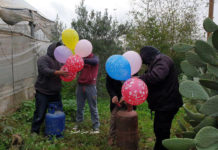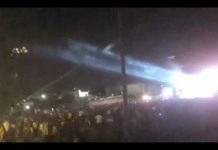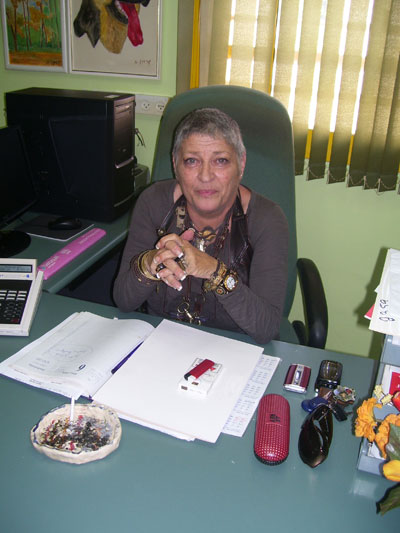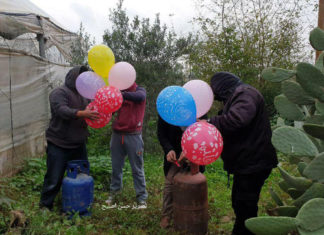“We have been in the midst of an ‘operation’ for 12 years,” says Dr. Adrianna Katz.
Despite the regular sounding of the Color Red siren warning of incoming fire and the subsequent booms as Kassam rockets strike their town, the residents of Sderot seem to be leading normal lives.
On Thursday, the second day of the army’s Operation Pillar of Defense against terrorist targets in the Hamas controlled Gaza Strip, life appears to continue with little or no change from the routine day-to-day activities.
Cars drive down the streets and shoppers frequent local businesses. A gardener can be seen pruning branches outside a house on a quiet residential street and several youths ride past on bicycles.
Outside a convenience store, several men sit and smoke cigarettes, appearing blasé and unmoved by the occasional rocket. Such is everyday life for the residents of one of the nearest Israeli cities to Gaza. At its closest point, Sderot is less than 1 kilometer from the Gaza border.
However, not everything is as placid as it appears, said psychiatrist Dr. Adrianna Katz, the director of the Sderot Mental Health Center, a clinic affiliated with the Barzilai Medical Center in Ashkelon that services the residents of Sderot and its surrounding moshavim.
Katz said that, following 12 years of regular rocket attacks, many of Sderot’s residents are suffering from the symptoms of various mental disorders, most notably posttraumatic stress disorder or PTSD.
Speaking to The Jerusalem Post from a makeshift office in the city’s downtown police station, having moved her base of operations in order to be more readily accessible to those in need of emergency services, Katz nonchalantly rose and strolled to the bomb shelter as a loudspeaker began blaring several seconds into the interview.
Standing in a bomb shelter equipped with stretchers and medical supplies, the feisty 63-year-old psychiatrist from Ashkelon, who appeared more like an aging hippie than a mental health professional, began to heatedly debate issues of supply and logistics with members of her team until it was deemed safe to emerge.
Continuing the conversation as if nothing had happened, Katz asserted that despite repeated promises from the government, specifically the Health Ministry, she has been operating on a shoestring budget for years.
Barzilai Medical Center, she said, does not have the budget to expand her operation.
Despite the fact that her clinic “takes care of several thousand” residents, Katz explained that in terms of personnel and budget it has “almost nothing.”
“In total, at the moment, our team consists of a secretary and three mental health professionals,” Katz lamented, saying that each member of her team treats many more patients than they can handle. “There have been times when I have been here alone with 50 people seeking treatment.”
Katz claimed that, despite occasional reports in the media, there have been no budget increases or staff expansions, even as the burden on her team increases.
“We still haven’t received anything. There are many who want [to help] but we still haven’t gotten anything.
I don’t know [why, but] the money isn’t being given to us,” the psychiatrist said.
Asked why she thinks that is the case, Katz gestured to a representative of the Health Ministry sitting next to her.
“Speak with the Health Ministry,” she replied. The representative, sent down to the South to coordinate with Katz’s team during the current emergency, leaned back and flatly refused to comment, saying that all inquiries must be made through the ministry’s spokeswoman.
However, when contacted, ministry spokeswoman Einav Greenbaum said that she did not know about Katz or the Sderot Mental Health Center.
While on the topic of the ministry, Katz asserted that over two years ago, Deputy Health Minister Ya’acov Litzman promised her a budget “to add another half psychiatrist and one social worker.”
However, she said, “two-anda- half years later, only now have I received the budget a week or two ago and now I will [be able to afford] half a psychiatrist and one social worker.”
Moreover, she said that she was not receiving any additional staff or budget to deal with the influx of victims sure to arrive at her doorstep during and after Operation Pillar of Defense.
While the makeshift center remained empty during the interview, Katz said that “any second a Kassam rocket can fall on a house inside the city, as just happened, and [even if] nobody is hurt physically, you may have seven people suddenly arriving here in trauma, suffering from shock. This can happen at any moment. This is not after the [military] operation [for which we are preparing].
We don’t know when the end of the operation will be.
We have been in the midst of an ‘operation’ for 12 years. It is just that sometimes it is more serious than other times.”










